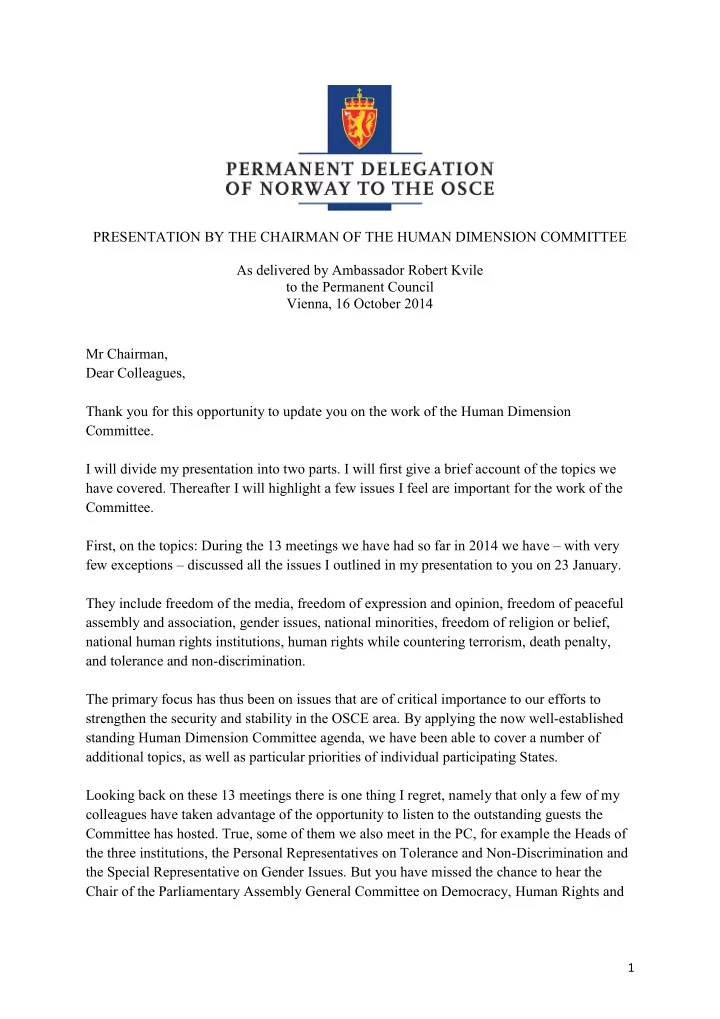

PRESENTATION BY THE CHAIRMAN OF THE HUMAN DIMENSION COMMITTEE As delivered by Ambassador Robert Kvile to the Permanent Council Vienna, 16 October 2014 Mr Chairman, Dear Colleagues, Thank you for this opportunity to update you on the work of the Human Dimension Committee. I will divide my presentation into two parts. I will first give a brief account of the topics we have covered. Thereafter I will highlight a few issues I feel are important for the work of the Committee. First, on the topics: During the 13 meetings we have had so far in 2014 we have – with very few exceptions – discussed all the issues I outlined in my presentation to you on 23 January. They include freedom of the media, freedom of expression and opinion, freedom of peaceful assembly and association, gender issues, national minorities, freedom of religion or belief, national human rights institutions, human rights while countering terrorism, death penalty, and tolerance and non-discrimination. The primary focus has thus been on issues that are of critical importance to our efforts to strengthen the security and stability in the OSCE area. By applying the now well-established standing Human Dimension Committee agenda, we have been able to cover a number of additional topics, as well as particular priorities of individual participating States. Looking back on these 13 meetings there is one thing I regret, namely that only a few of my colleagues have taken advantage of the opportunity to listen to the outstanding guests the Committee has hosted. True, some of them we also meet in the PC, for example the Heads of the three institutions, the Personal Representatives on Tolerance and Non-Discrimination and the Special Representative on Gender Issues. But you have missed the chance to hear the Chair of the Parliamentary Assembly General Committee on Democracy, Human Rights and 1
Humanitarian Questions, three UN Special Rapporteurs, one former UN Special Rapporteur and a number of prominent human rights experts. I should use this opportunity to pay tribute to my small but very competent HDC team, who has even managed to bring to Vienna a UN Special Rapporteur all the way from South Africa. Let me now raise a few issues related to the work of the committee. My first point is the following: There is a clear relationship between the mandate of the Committee and the standing agenda. We may however need to look at ways to strengthen our ability to translate the discussions in the Committee into action, or at how we can make sure that the Human Dimension Committee can feed into the work of the Permanent Council and the different human dimension events, as foreseen in the mandate. My second point is on the agenda itself. I have continued to apply the standing agenda introduced in 2011. It ensures a systematic and comprehensive approach to the third dimension, in line with the mandate of the Committee. It also ensures structured and efficient meetings. For many of the meetings we have been able to establish a thematic coherence between the main topic, the voluntary report and the presentations by OSCE executive structures. Such thematic coherence could perhaps invite the Chair to combine some of the agenda items, and in this way allow the delegations to make more comprehensive responses and statements on the issues under discussion. This would in short imply retaining the standing agenda, but applying it flexibly when appropriate. My third point is on voluntary reporting. We have heard 11 voluntary reports. They serve two important objectives, namely the sharing of best practises and the strengthening of the implementation of OSCE commitments. We should therefore strive to have at least one voluntary report at each meeting. This requires active support from delegations. Some delegations have voiced doubts as to the usefulness of voluntary reports. It is my hope that the reports we have had so far have helped to remove their scepticism. My fourth and final point is on civil society. The Swiss Chairmanship has defined stronger involvement of civil society as a priority. I would have liked to invite civil society to the Committee on a more regular basis. My ambitions in this regard must take into consideration strong opposition from some delegations. I look forward to the day when we all recognize that the critical voice is indispensable. By way of concluding, two additional quick points: 2
First, we do not plan any further ordinary Committee meetings between now and the Basel Ministerial. Instead we will devote our time to drafting possible deliverables. After the Ministerial – on 16 December – Michael Georg Link and Dunja Mij atović will inf orm us of the work of their institutions during 2014 and of their plans and priorities for 2015. As already mentioned by the Chairperson of the Chairperson of the Economic and Environmental Committee we currently are contemplating the possibility of organising a joint meeting on good governance. Finally, I enjoy chairing the Human Dimension Committee! But it would not have been enjoyable without the strong support of you, Mr Chairman, the delegations, my own team and the OSCE institutions. My thanks also go to my Serbian colleague, Ambassador Vuk Žugić , who handed over a well-run Committee. Mr Chairman, this concludes my presentation. 3
Recommend
More recommend